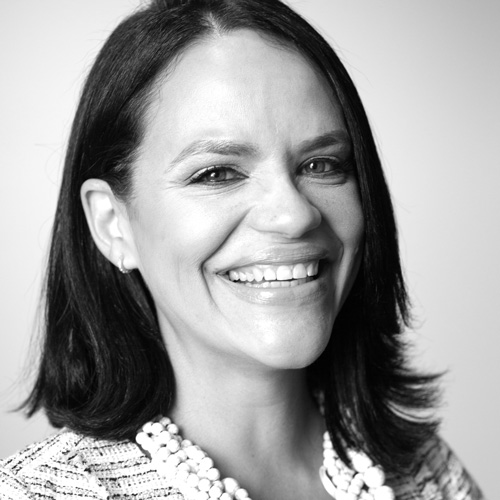Every other summer of her childhood, Abigail Epane-Osuala left her home in Douala, Cameroon, to visit her grandparents in the town of Likomba. Her grandparents were farmers and merchants, and every Tuesday, she accompanied them to the local marketplace to sell goods from their store. She carried her grandmother’s canned tomatoes around the marketplace on a tray, negotiating prices and convincing potential buyers that these tomatoes were, in fact, the best. “It was always the more seasoned people buying stuff from me because I would talk to them and engage them,” she says. “You need to be connected to people for people to feel connected to you.”
As vice president, human resources, specialty surgical solutions (SSS), at Integra LifeSciences, a global medical technology company, Epane-Osuala uses this philosophy of connection to advocate for an inclusive, diverse workplace within the SSS division.
When leading global teams, Epane-Osuala engages her team members in decision making, recognizing their concerns and incorporating their feedback. In February 2017, Integra announced its plan to acquire the Johnson & Johnson Codman Neurosurgery business—a plan that requires the company to integrate Codman employees from sixty-eight countries. In leading the HR work stream for this integration, Epane-Osuala’s first step was to bring Integra’s global HR leaders together to gather input on how she could best support them through the process. “It’s not just about giving directives to people,” she explains. “Even though at the end of the day, the final accountability for leading the HR work stream rests on me, and just allowing folks to be part of the process, to opine on it and give their input, goes a long way and really makes the team effective for a smooth execution.”

When she wasn’t visiting her grandparents, Epane-Osuala spent summers traveling the world with her parents, meeting new friends in each country she visited. Her wide travels as a young woman gives her a cultural and linguistic understanding of the perspectives held by her current and prospective colleagues. “When you’re working with teams around the world, you need to understand the different cultures. You need to allow for those different nuances not to be a barrier to the way you work,” she says. “When people understand that you appreciate their culture, they’re more open to you.”
In order to gain the trust of her multilingual colleagues who are spread across the globe, many of whom she has never met in person, Epane-Osuala emphasizes flexibility. When meeting with a team from France, she typically speaks French—one of the six languages she knows. “Using their native language makes them feel comfortable,” Epane-Osuala explains. “They become very receptive to getting stuff done. They know that I understand what they’re doing or saying.” She applies this same flexibility to scheduling meetings and events, ensuring that she considers not only what time zones are convenient for those in the Americas, but what will work for those around the globe.
Epane-Osuala encourages different perspectives within the SSS division at Integra as well. When hiring, she ensures that each slate of candidates is diverse, both in terms of essential qualities such as nationality or gender, as well as in skills and experience. “I’m not saying that I have to hire diverse candidates, but I’m saying let’s give folks an opportunity,” she says. “I always say I’m blessed because someone gave me the opportunity.”
Hiring diverse candidates is especially important at the leadership level. “The leaders shape the organization,” Epane-Osuala says, so demonstrating inclusion at the highest levels of leadership creates a model for the rest of the organization. Diverse leaders are more likely to hire diverse candidates, Epane-Osuala says, and representing different perspectives encourages different approaches to solving problems. Leaders from all backgrounds can serve as valuable allies and stress the importance of diversity within the organization. “It starts at the top,” Epane-Osuala says. “When you don’t have leadership advocating for diversity, you will be unable to sustain it.”
“You need to be connected to people for people to feel connected to you.”
Epane-Osuala has focused not only on increasing the number of women who are hired to work at the SSS division, but also on improving the company’s ability to retain these colleagues. She creates opportunities for people to see and feel the impact of inclusion. For example, every year at the division’s national sales meeting, she hosts a Women of Sales Luncheon. At this year’s event, she was able to recognize that half of the top sales performers were women, which was significantly more than the previous year. Putting a spotlight on this success allows colleagues to see a pathway to accomplishing their own goals. “Making sure that the organization knows that you’re paying attention to inclusion will drive that culture,” she explains.
Epane-Osuala further highlights diversity by supporting employees in creating affinity groups. The SSS Women of Sales network gives women a space to discuss issues they face and provides resources for one another. And when Epane-Osuala was approached by a group of African American employees about celebrating African American history month, she supported them in creating an annual celebration in February by inviting speakers and ensuring the CEO, CHRO, and senior leaders attended the events. “I don’t have to be African American to understand that these employees want to do something that celebrates their heritage,” she says. “Acknowledging something that they value, which is their culture, makes them want to stay at Integra and makes them want to work harder for Integra.”
For Epane-Osuala, the support of her family, peers, and leaders—particularly her CHRO—are fundamental to her success. “To become a successful leader, you can’t do it by yourself,” she says. “While I have always raised my hand and seized opportunities, I would not have gotten to where I am if someone did not take a chance and give me the opportunity.”


